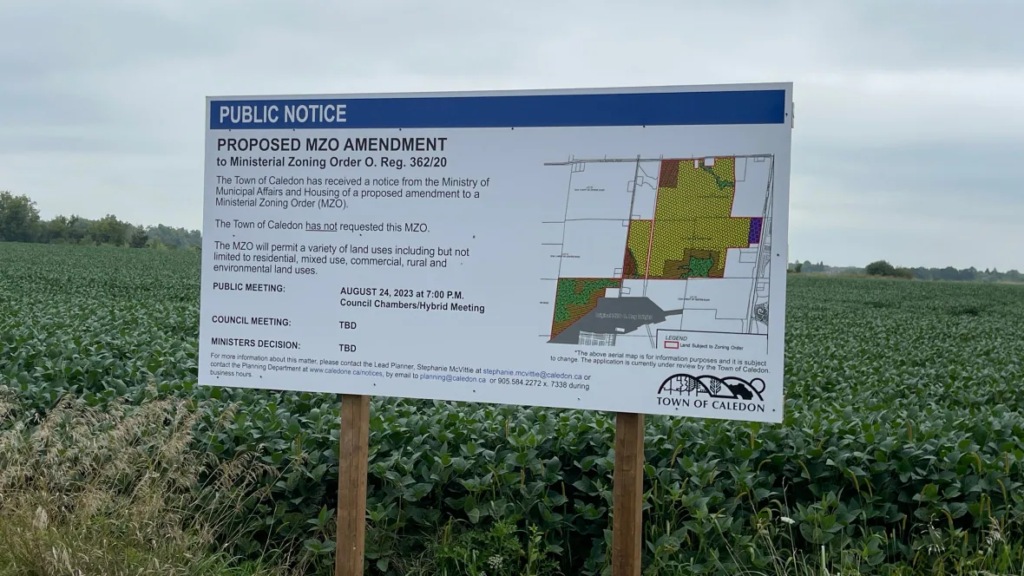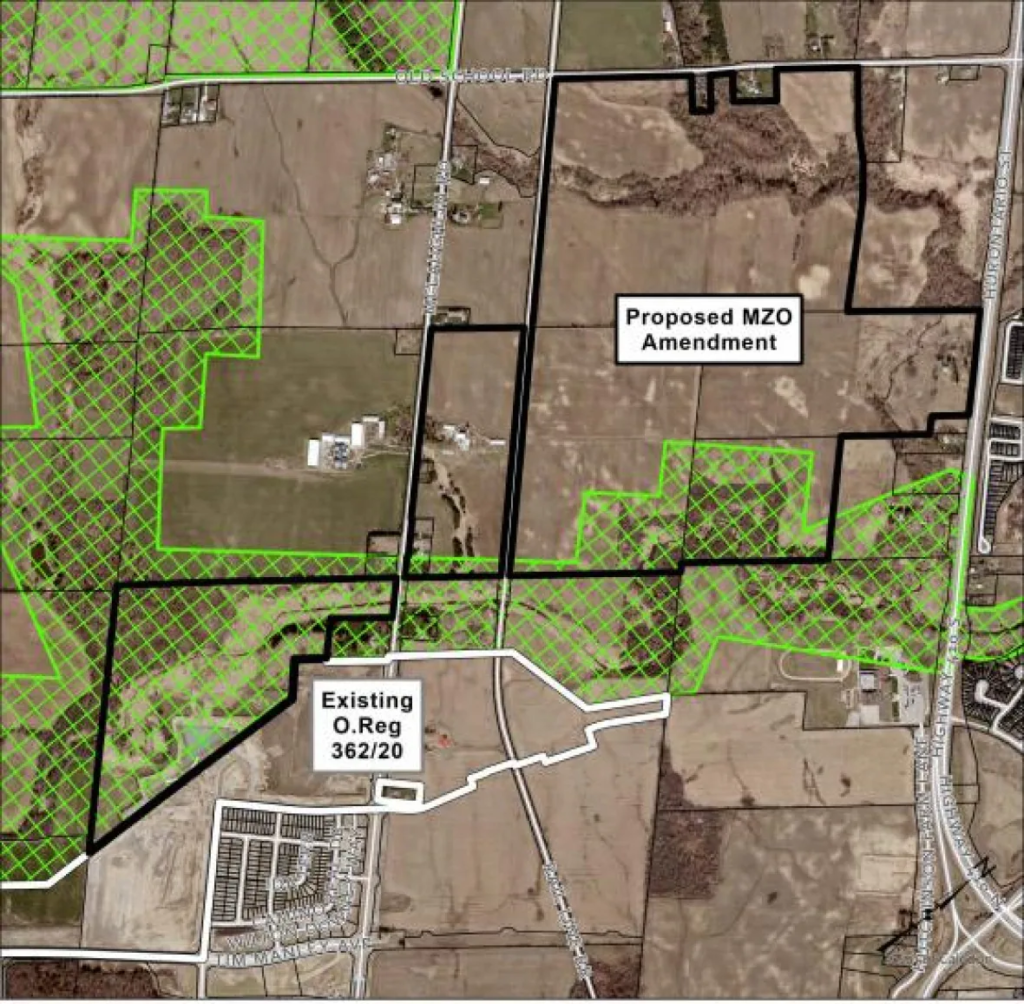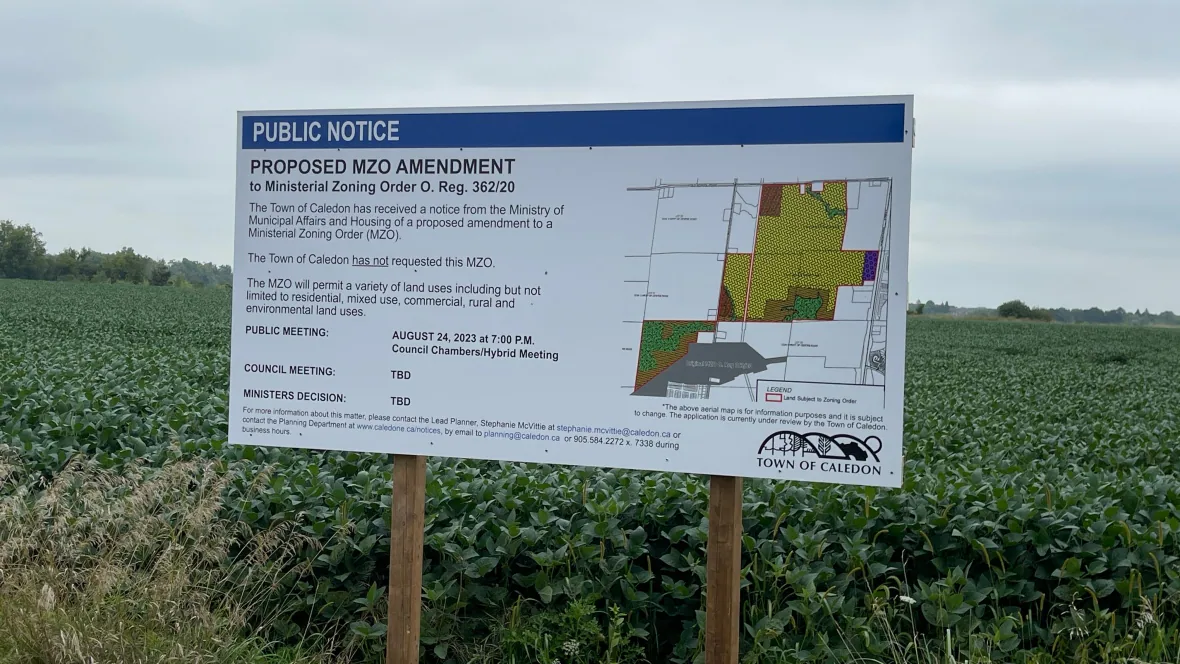The Ontario government has announced that the proposed new subdivision in Caledon will no longer encompass Greenbelt land, marking a shift from its earlier intention. This decision comes weeks after local residents were informed about the province’s plan to utilize its authority for development within a portion of the protected Greenbelt area.
Situated approximately 45 minutes northwest of Toronto, the township held a meeting on Thursday evening to deliberate on a proposed adjustment to a ministerial zoning order (MZO). The proposed change would have permitted the development of 141 hectares of land, mostly farmland, adjacent to the future location of Highway 413. Among this expanse was 41 hectares of land protected within the Greenbelt.
Ministerial zoning orders (MZOs) are tools employed in urban planning that enable the province to bypass local planning regulations and accelerate the execution of desired projects.
In a turn of events just prior to the meeting, both CBC Toronto and the town itself were informed by the province that contrary to the initially proposed amendment, the Greenbelt lands would remain safeguarded. As a result, the scope of the MZO amendment will now be limited to 100 hectares.
Various stakeholders, including town planning personnel, the local fire department, and the Toronto and Region Conservation Authority, expressed criticism regarding the proposal to develop the land situated along Hurontario Street and McLaughlin Road, to the south of Old School Road.
The unexpected alteration in strategy coincides with the ongoing and rigorous examination that the Ford government is undergoing regarding its proposal to establish housing on 15 locations within the Greater Toronto and Hamilton Area (GTHA). These sites had been excluded from the Greenbelt in the previous December.
A fortnight ago, the provincial auditor general revealed that the government’s selection procedure for these sites exhibited a preference for a select few affluent developers with well-established connections, positioning them to potentially generate substantial profits amounting to billions of dollars. This controversy subsequently led to the resignation of the chief of staff to the housing minister and sparked the possibility of a potential RCMP investigation into the matter.
Upon discovering the proposed MZO amendment following the public announcement on August 3, Caledon residents expressed strong displeasure at the inclusion of Greenbelt land in the proposal.
During the public assembly, Cheryl Connors, a resident of Caledon, fervently appealed to the council to reject the MZO.
“It’s not good for the people of Caledon, it’s not good for us as taxpayers,” Connors said at the meeting.
“The environmentally sensitive features on that site will be harmed by putting dense housing development right there,” Connors said, speaking earlier to CBC Toronto before the meeting.

Benefiting a member of a notable developer family, the chronicle commenced nearly three years ago, as documented by the Town of Caledon.
In July 2020, the province issued an MZO to facilitate the construction of a new residential enclave in Caledon’s Mayfield West region, involving several prominent developers. These landowners encompassed Brookvalley Project Management, Fieldgate Developments, Laurier Homes, Mattamy Homes, Paradise Developments, and The Conservatory Group.
During the preceding year, Brookvalley Project Management, led by Nick Cortellucci from a distinguished Vaughan-based developer family, presented a proposition to erect 4,551 predominantly single-family homes on its adjacent land, contiguous to the territory covered by the 2020 MZO.
In the recent past, Town of Caledon personnel advised council members to dismiss the proposal, deeming it “premature” and “incomplete.” Consequently, the council referred the matter back to the staff for further planning efforts.
A public notice, posted on the town’s website on August 3, 2023, disclosed that the town had received notification of the province’s intention to modify the 2020 MZO. The proposed amendment aimed to extend its coverage to encompass 141 hectares presently utilized primarily for rural residential, agricultural, and environmental purposes. Approval of the amendment would have authorized residential and commercial development while reducing environmental safeguards on the Greenbelt lands.
The Town of Caledon emphasized on its official website that the initiation of the MZO was not a result of its request, highlighting that the decision was solely within the discretion of Minister of Municipal Affairs and Housing, Steve Clark.
Addressing the proposed MZO amendment, officials from Caledon’s planning department expressed concerns. They stated that the proposed “majority low-density” development for the designated lands would contribute to the creation of “incomplete communities and urban sprawl,” promoting increased reliance on automobiles and contradicting the town’s established climate policy.
“Low density residential is outdated and does not support Caledon’s climate change goals, the Caledon green development standards, and general good planning,” staff said.

The conservation authority expressed its opposition to the proposed development on the grounds of inherent natural risks. These hazards encompass floodplains connected to tributaries of the Etobicoke Creek, as well as the inclusion of Greenbelt land.
According to Chris Poulos, the spokesperson for the Ministry of Municipal Affairs and Housing, a request for an MZO concerning the Mayfield West lands in Caledon was received on June 1, 2023. In compliance with the provisions of the Planning Act, public consultations were initiated the subsequent month.
“Through the consultation process it was brought to our attention that the amendment — as submitted by the proponent — contained a section of lands located within the Greenbelt,” Poulos wrote in an email statement.
“While feedback is still under review, any consideration of this amendment would not include protected lands located within the Greenbelt.”
CBC Toronto requested comment from Brookvalley Project Management but didn’t receive a response.
Our planning lacks a clear purpose,’ remarks a resident. This marks the most recent in a series of MZOs issued by the province in Caledon, a town with a population of 76,581 as of 2021, projected to expand to 300,000 by 2051.
In March of 2022, the province employed an MZO to facilitate the establishment of 4.5 million square feet of industrial structures by the developer Tribal Partners. Another was issued in September 2022, granting permission to the Rice Group for the construction of an expansive industrial park to the east of Torbram Road.
As reported by the local media outlet The Pointer, the Progressive Conservative government led by Ford has issued a total of four MZOs in Caledon since 2020, with only three of these garnering the approval of the local council.
Cheryl Connors, the concerned resident, expressed that the province’s escalating utilization of MZOs diminishes opportunities for public input and erodes the municipal authority’s role in the planning process.
“Municipalities have lost their ability to govern and are turning into agencies of the provincial government where they have no say on when, where and how development occurs and who’s paying for it,” she said.
Kathleen Wilson, a resident of Caledon and an advocate for effective local governance, asserted that the MZOs in Caledon are primarily serving the interests of individual developers rather than benefiting the residents.
“We’re not planning with purpose,” said Wilson, who also spoke to CBC Toronto before the public meeting. “We’re planning because some developer bought some farmland for a really great price and they want to make a lot of money off of it.”
Wilson remarked that the latest amendment through the MZO will not result in the creation of affordable housing. She estimated that the forthcoming homes built in that area will likely be priced at a minimum of $1 million.
After the public meeting held on Thursday, the staff in Caledon will compile a comprehensive report for the council. This report will encompass input from various town agencies, departments, as well as public feedback.



